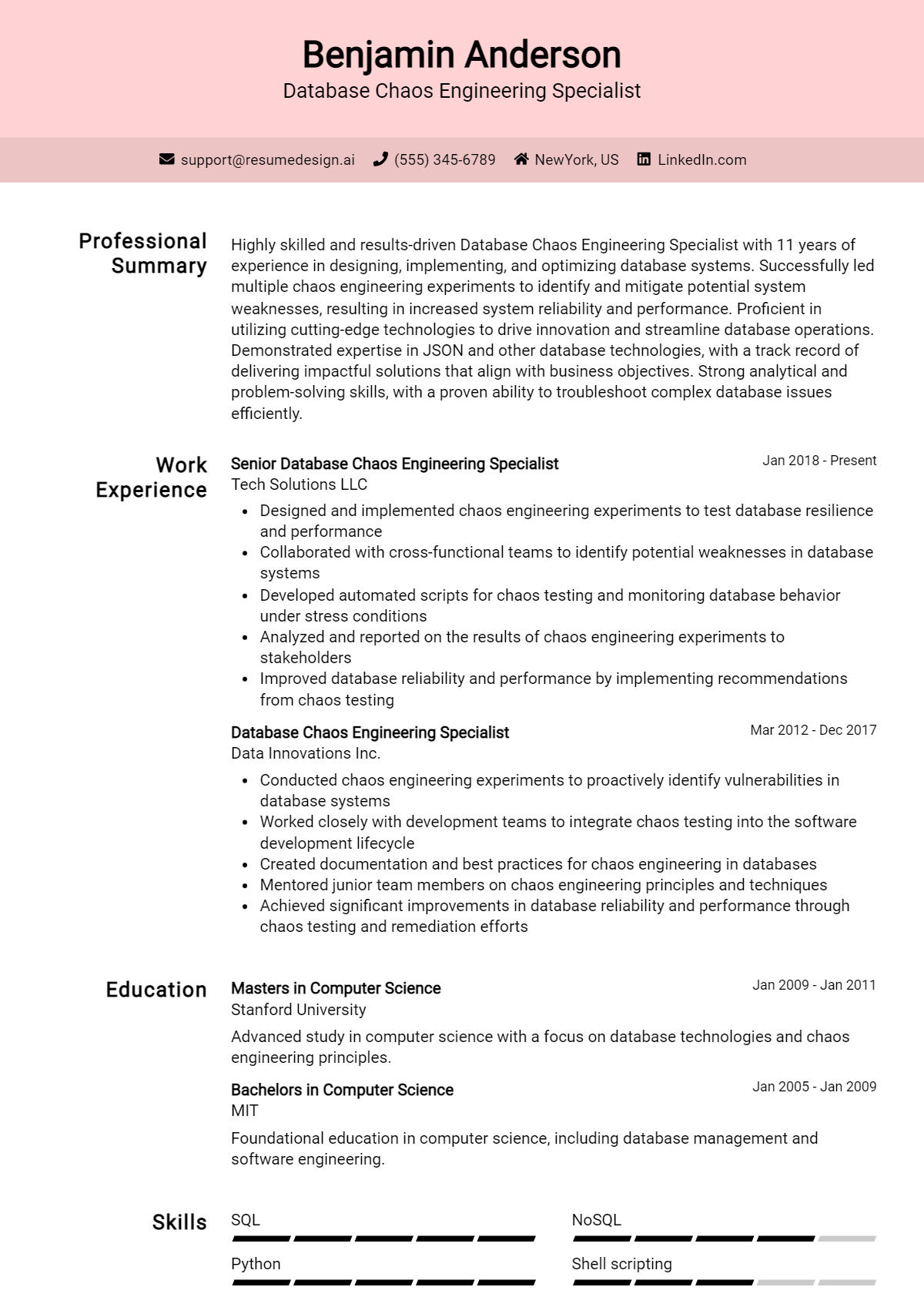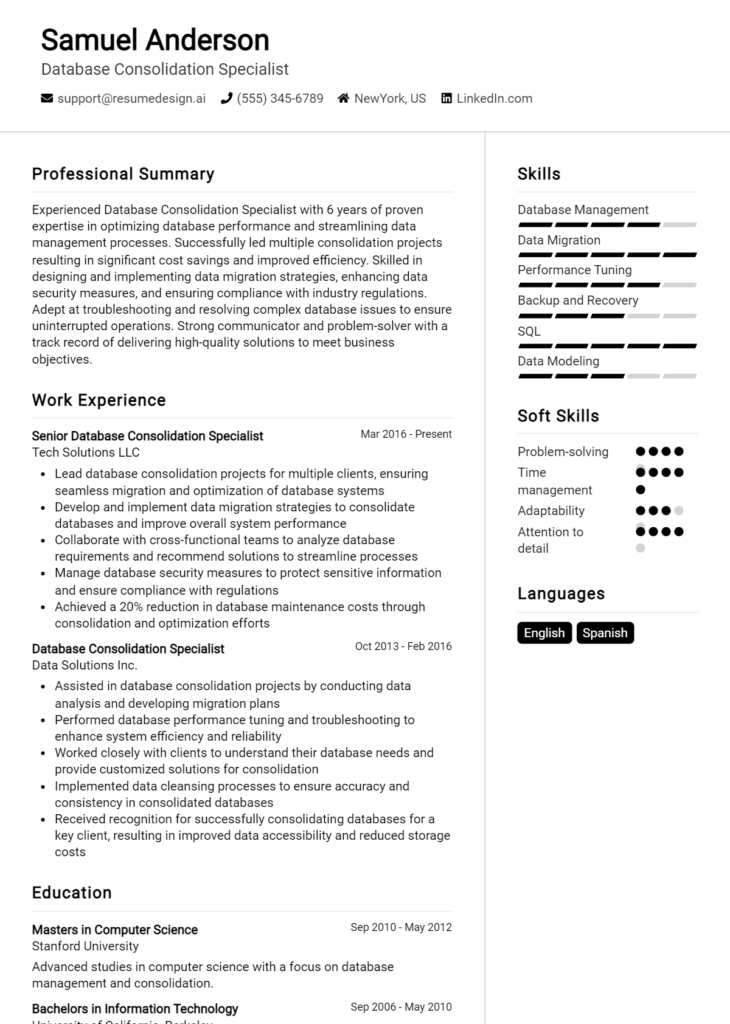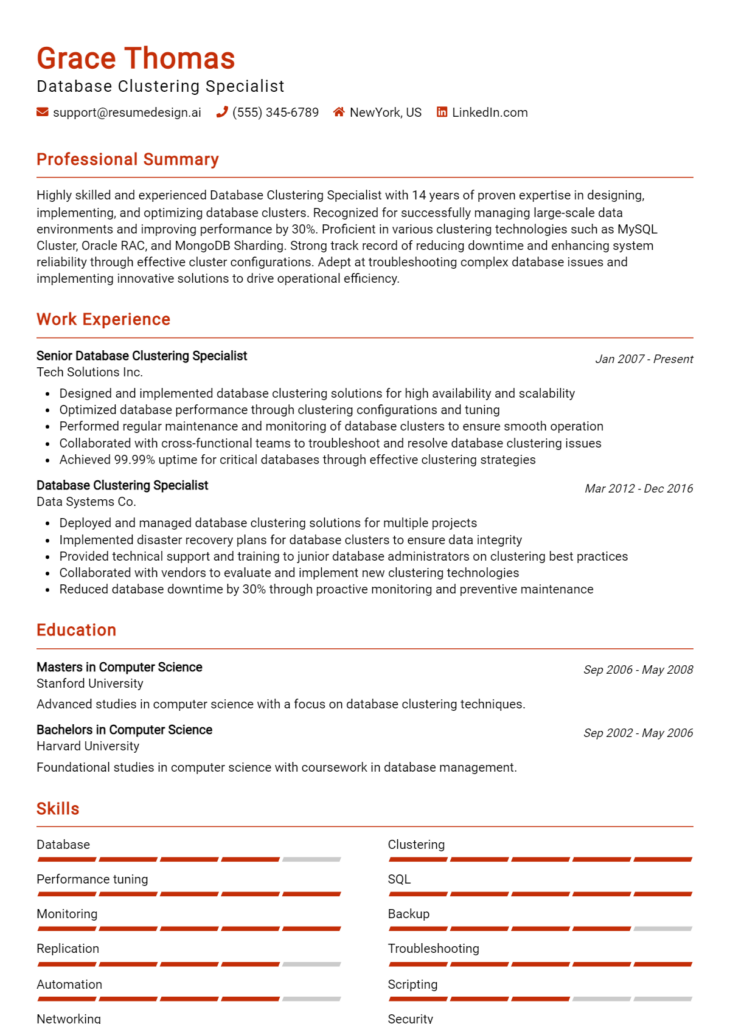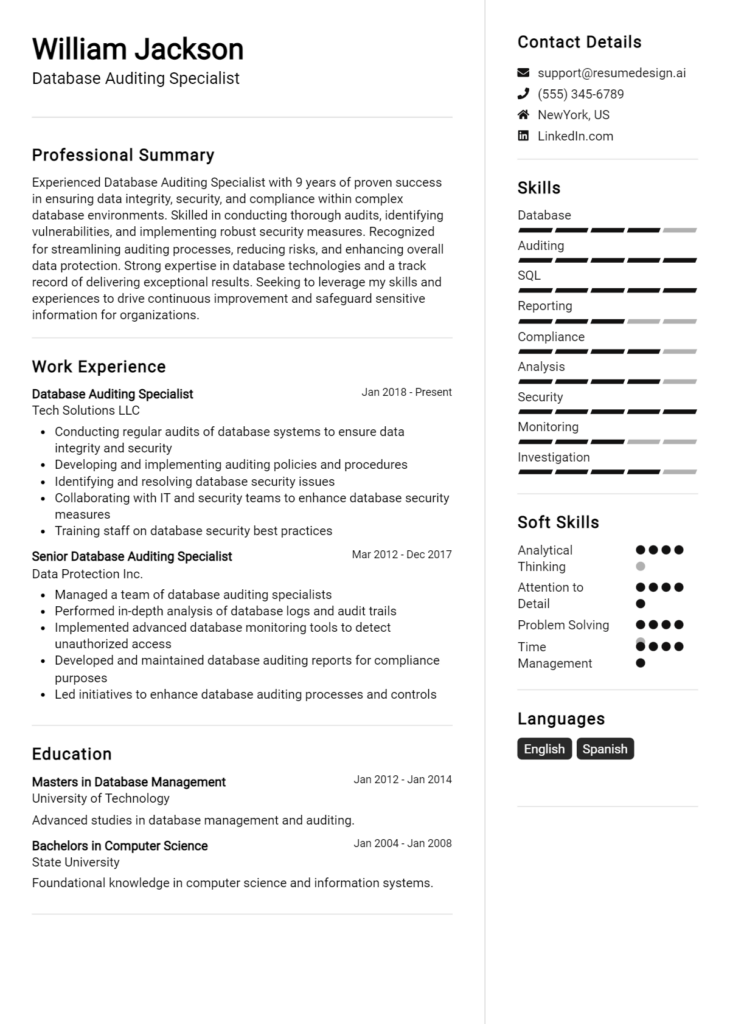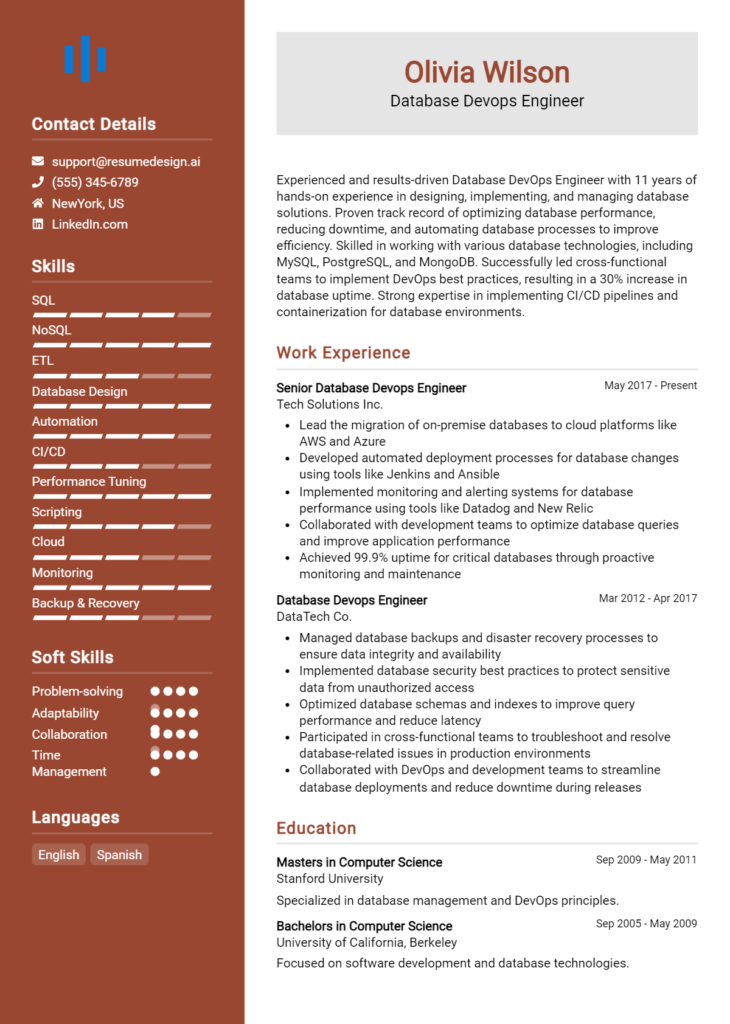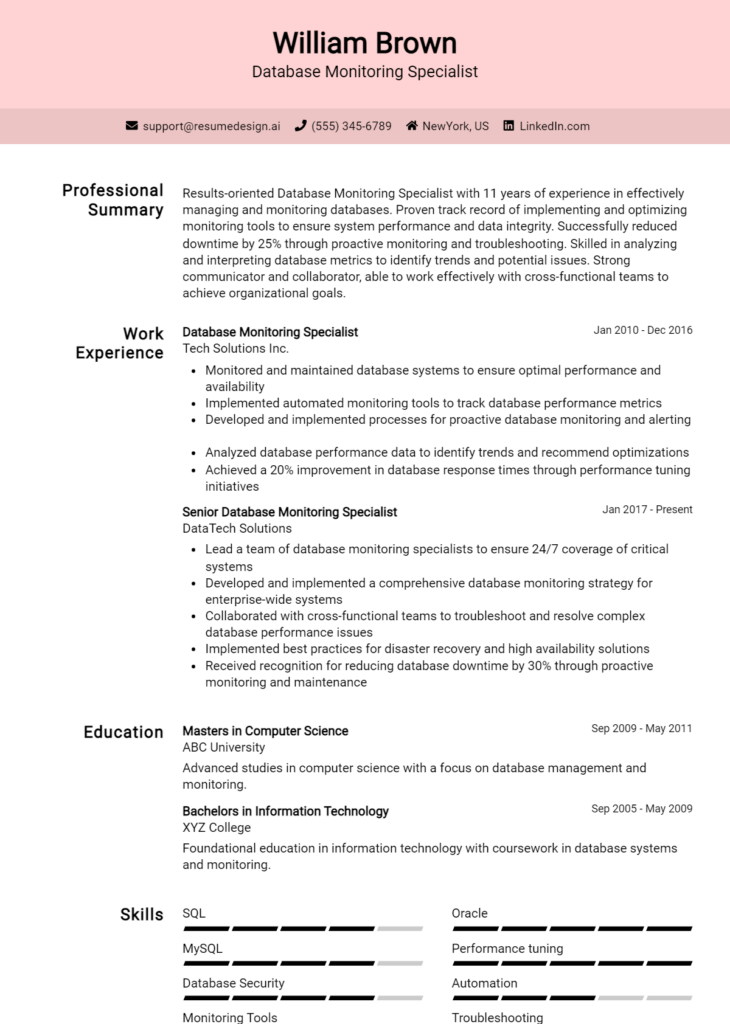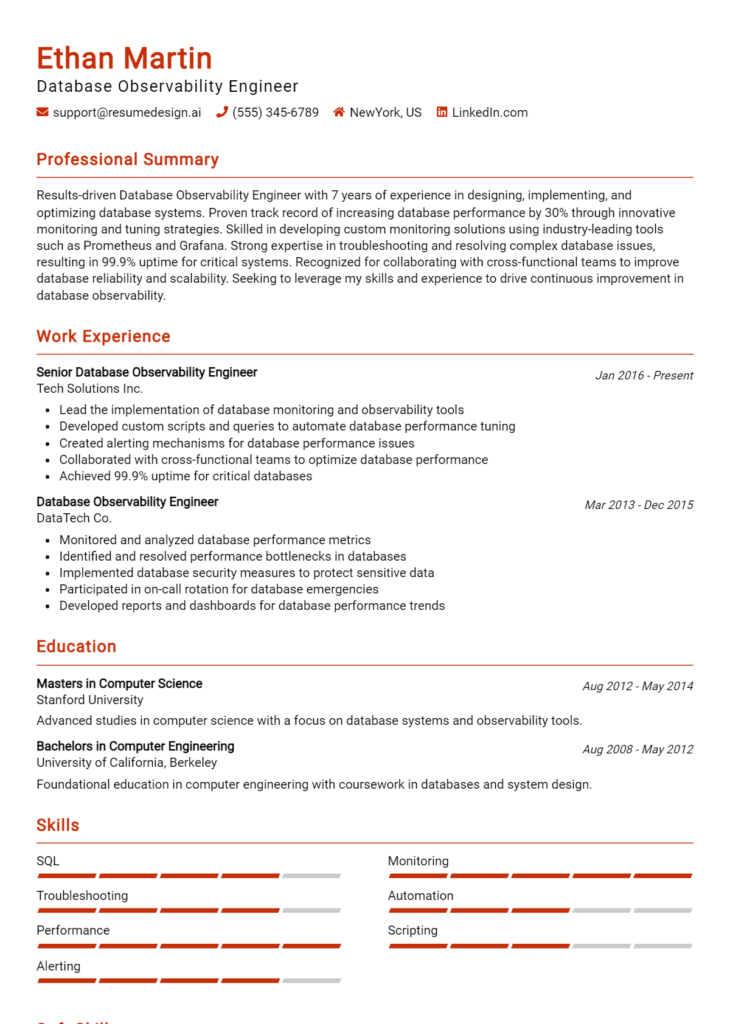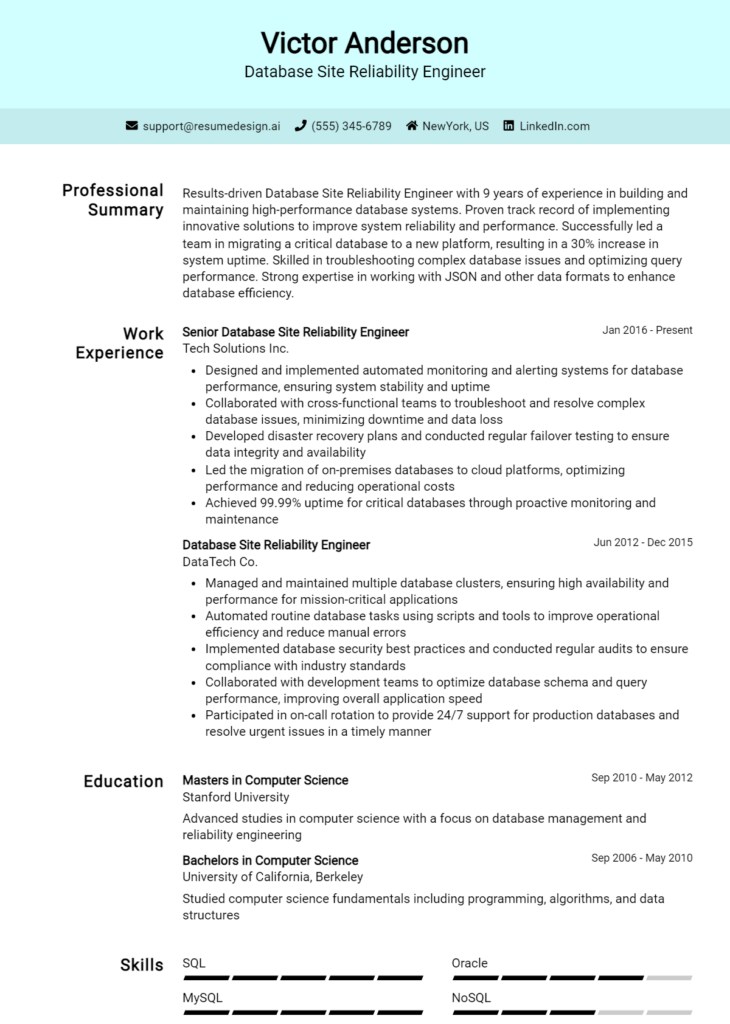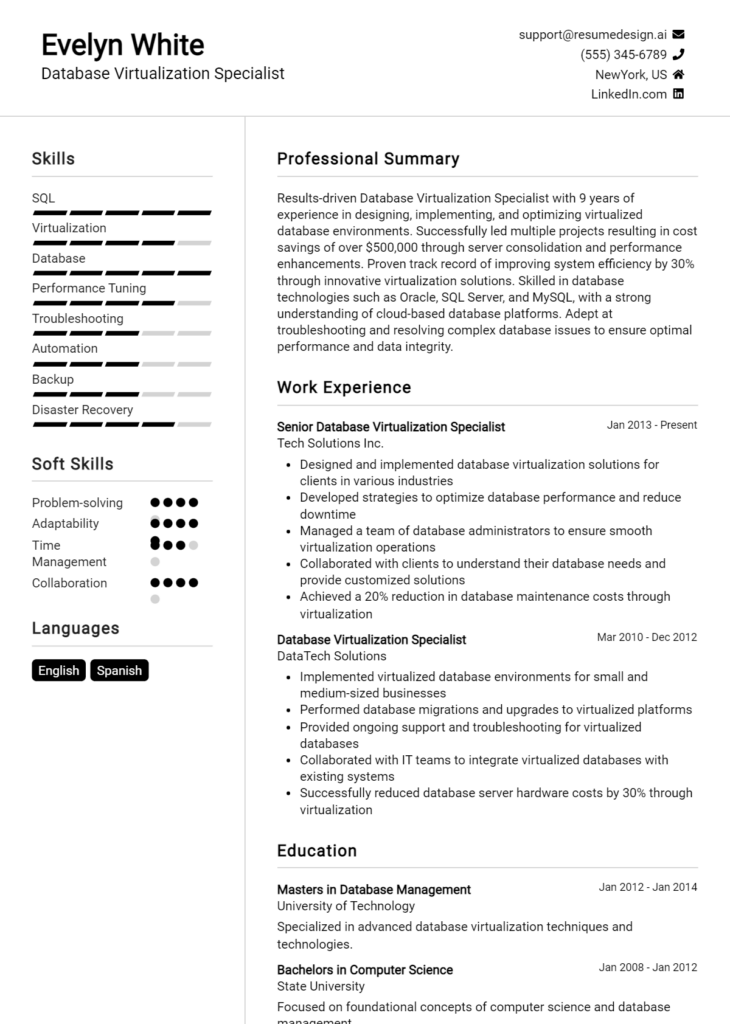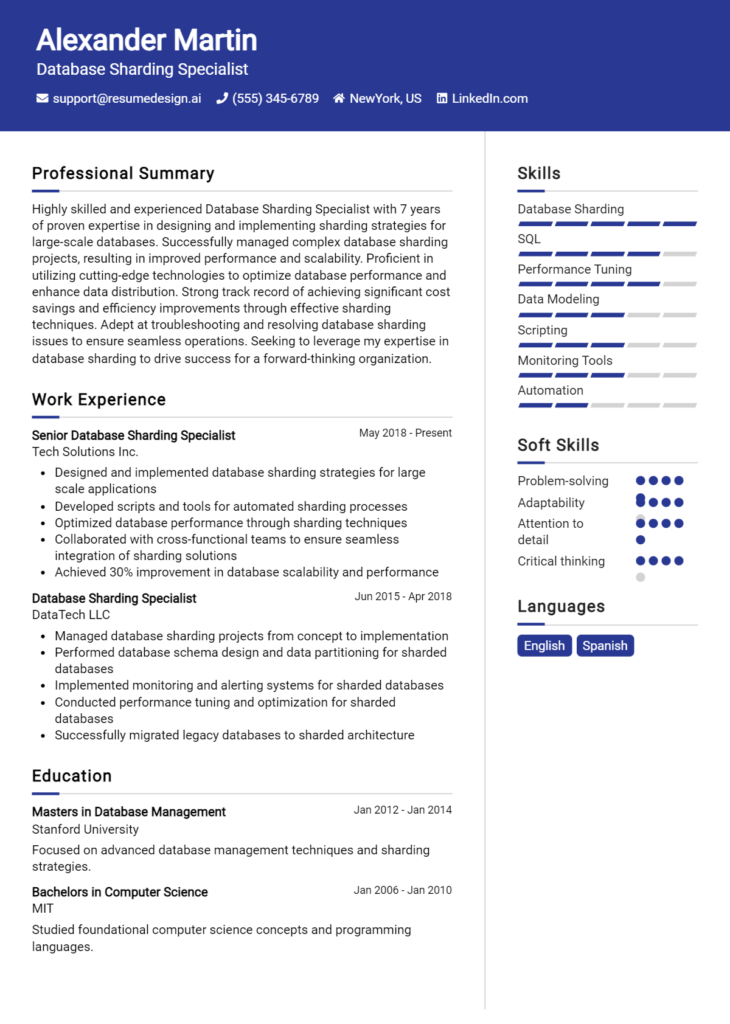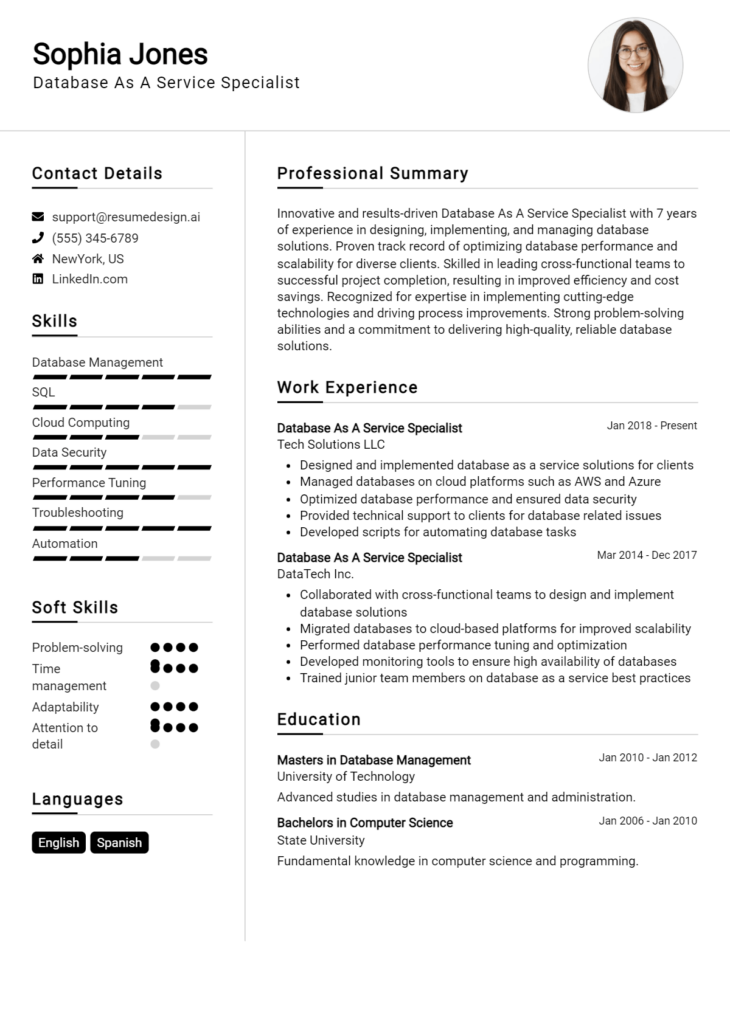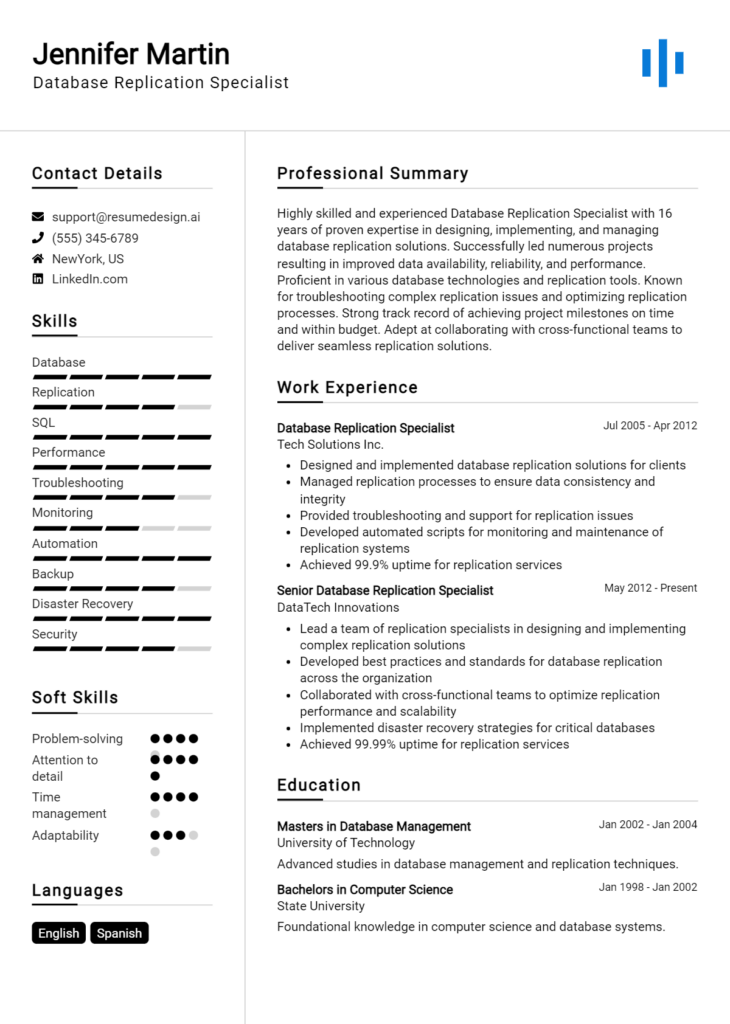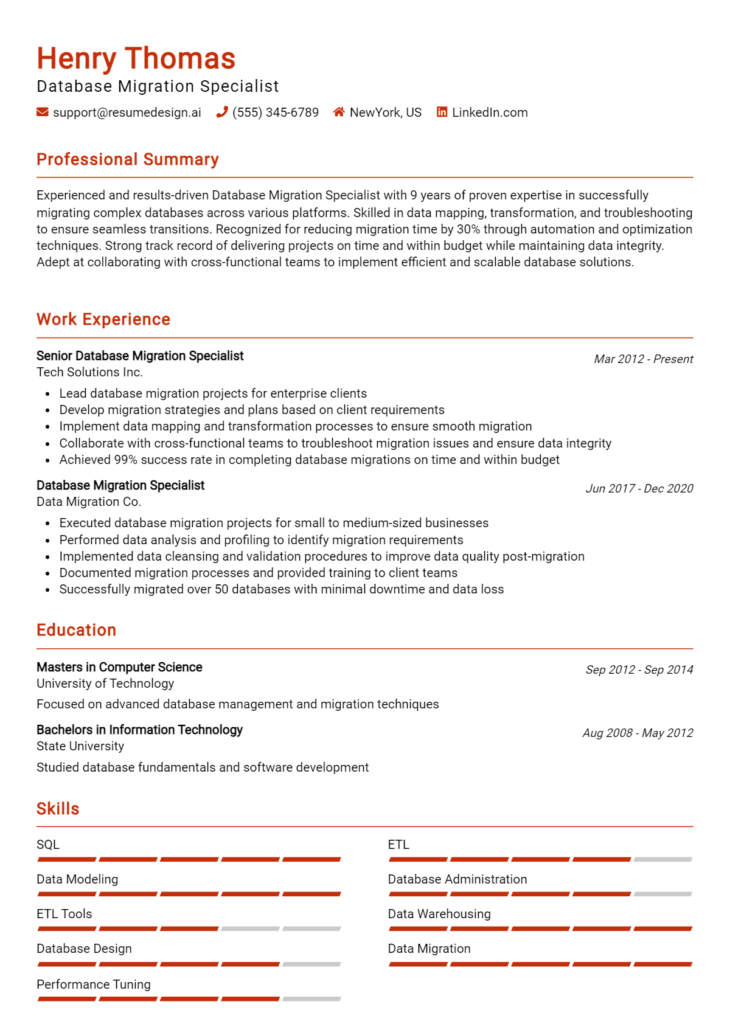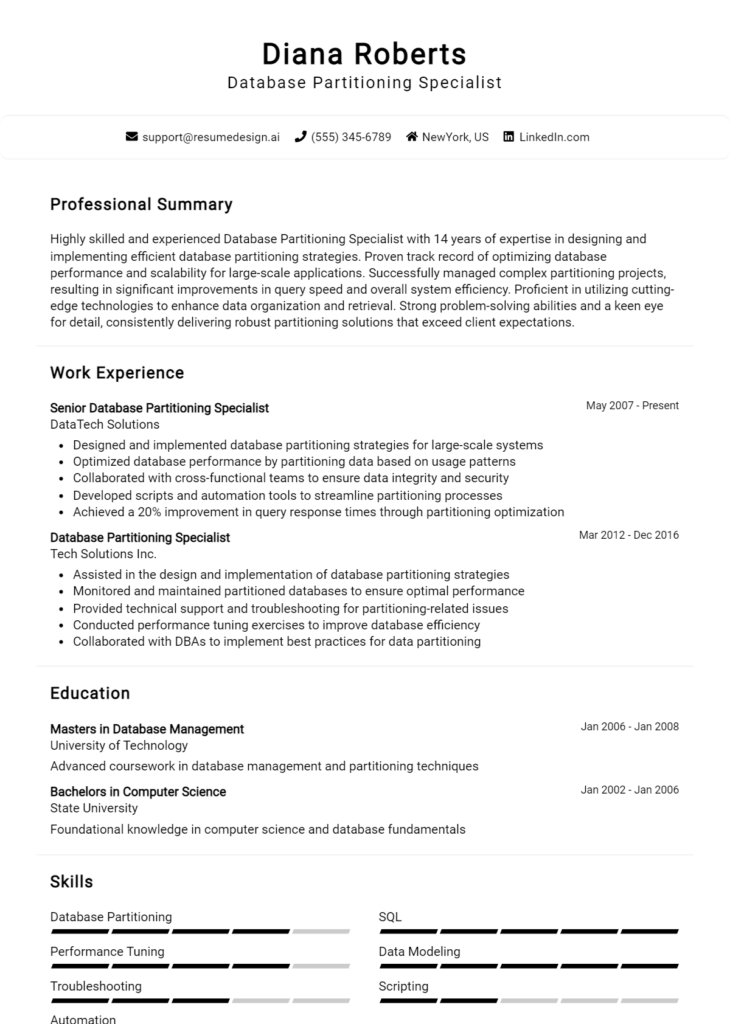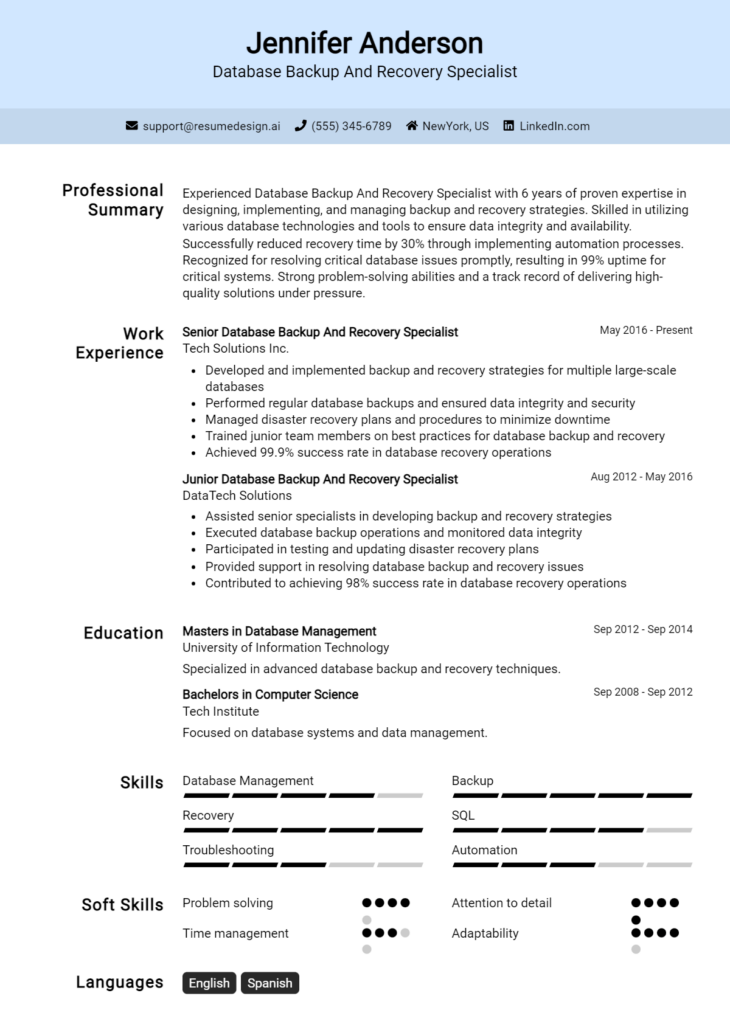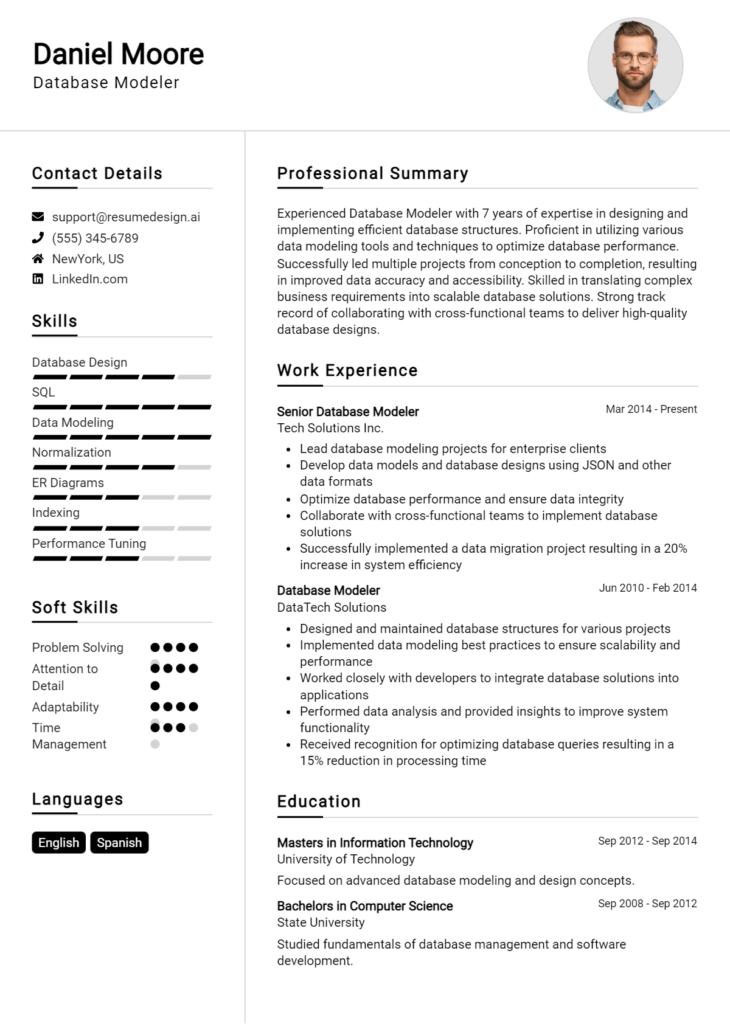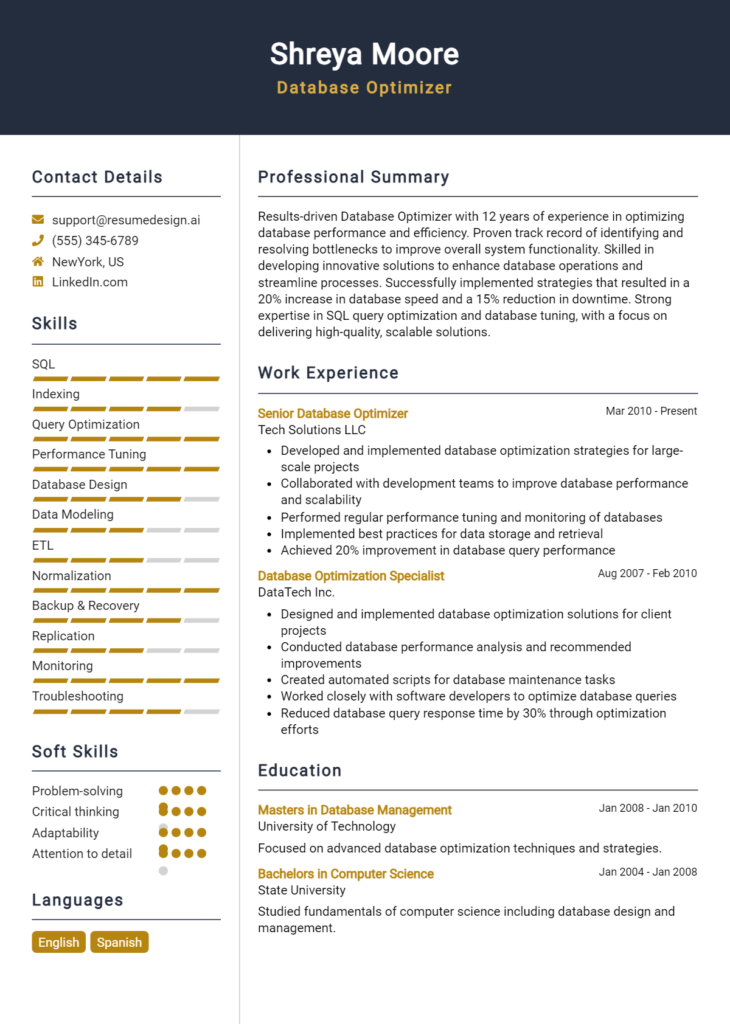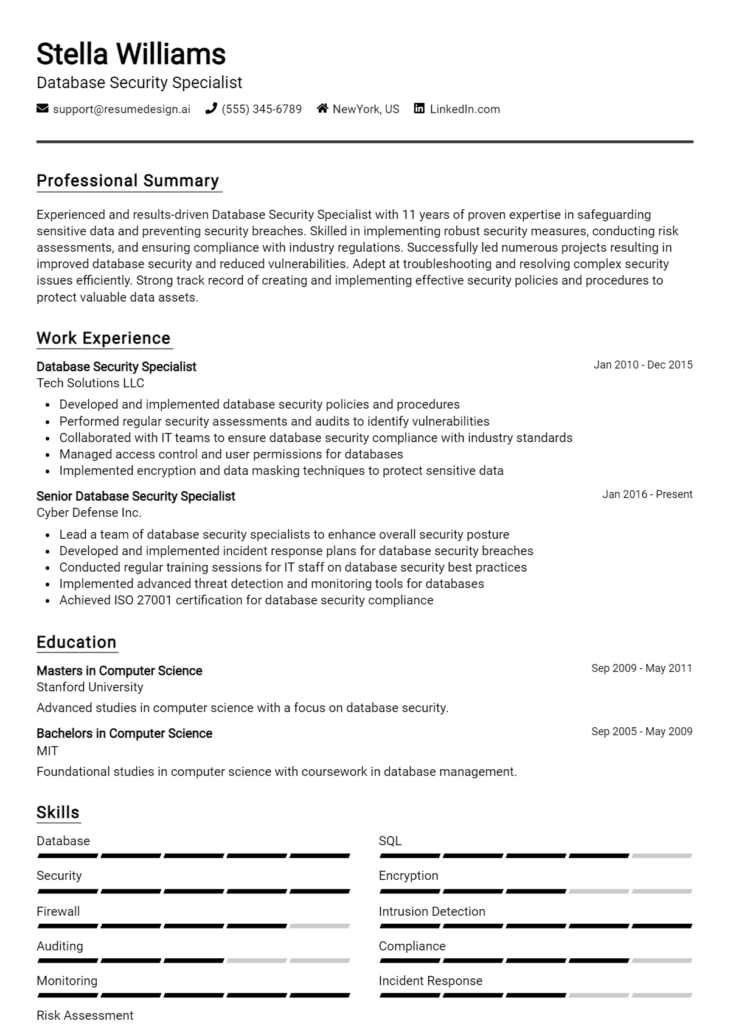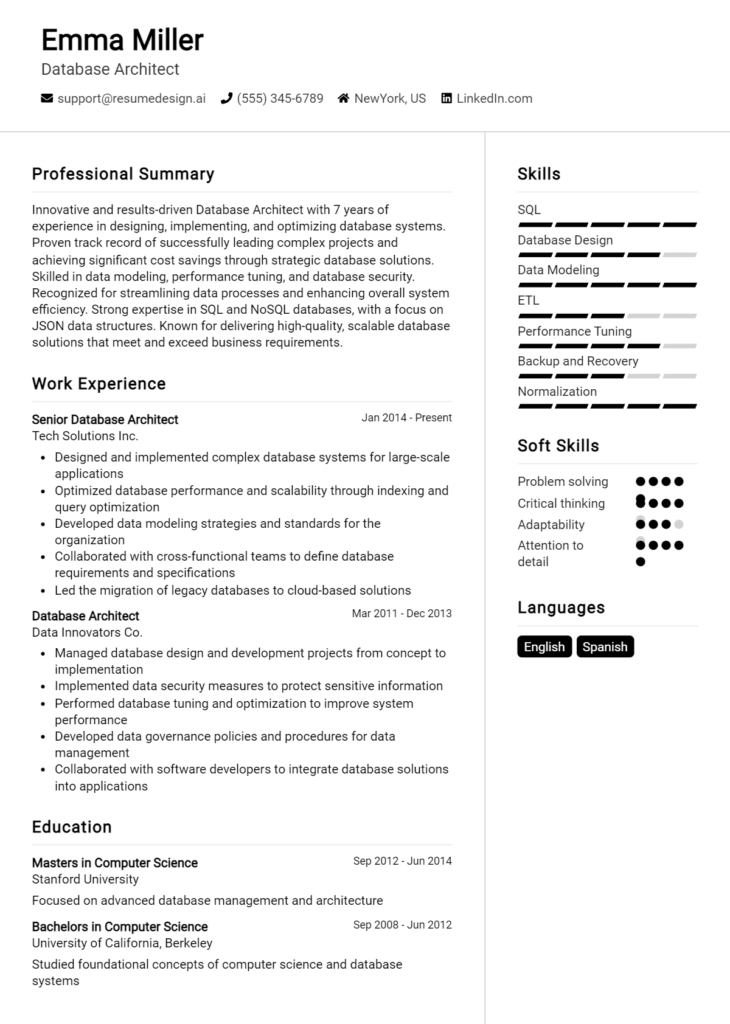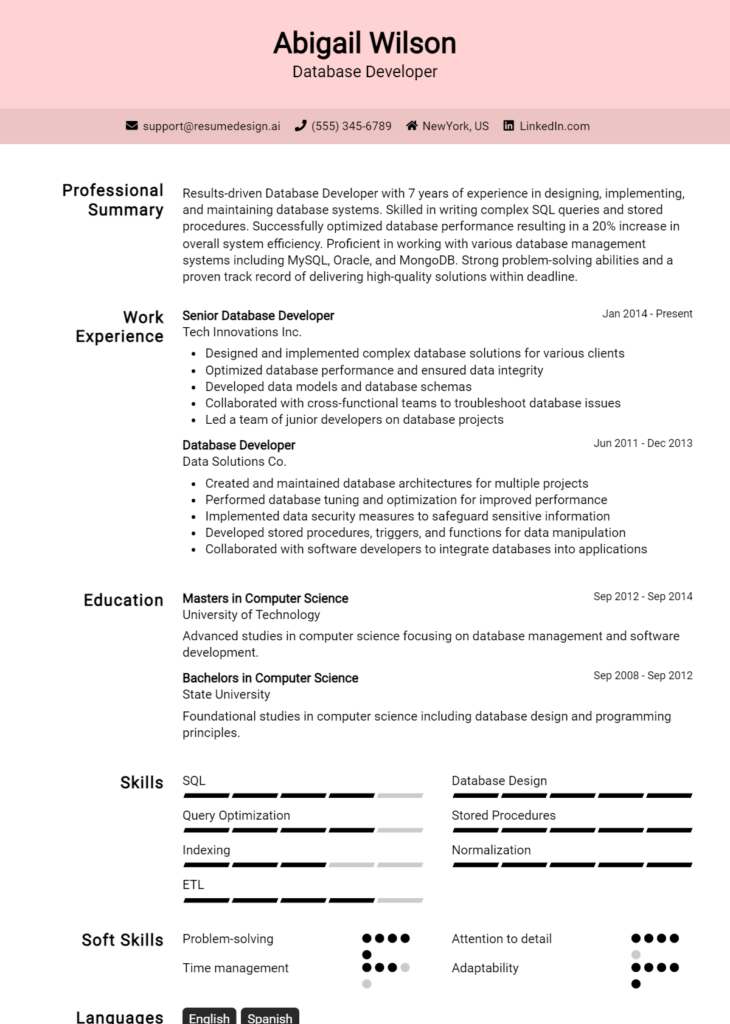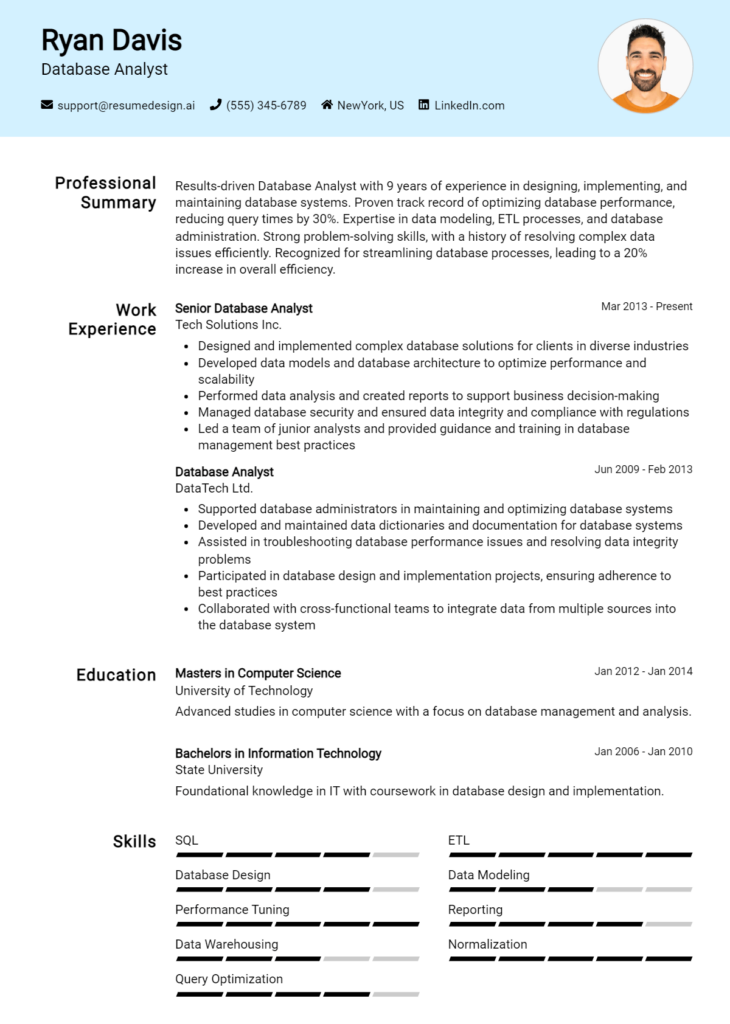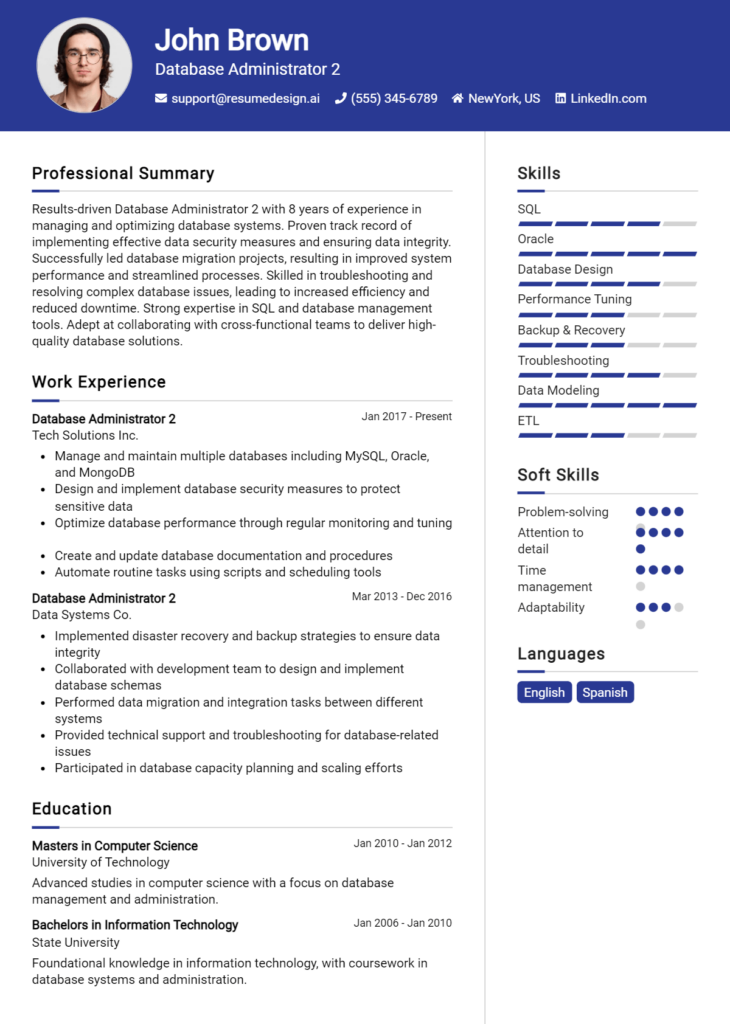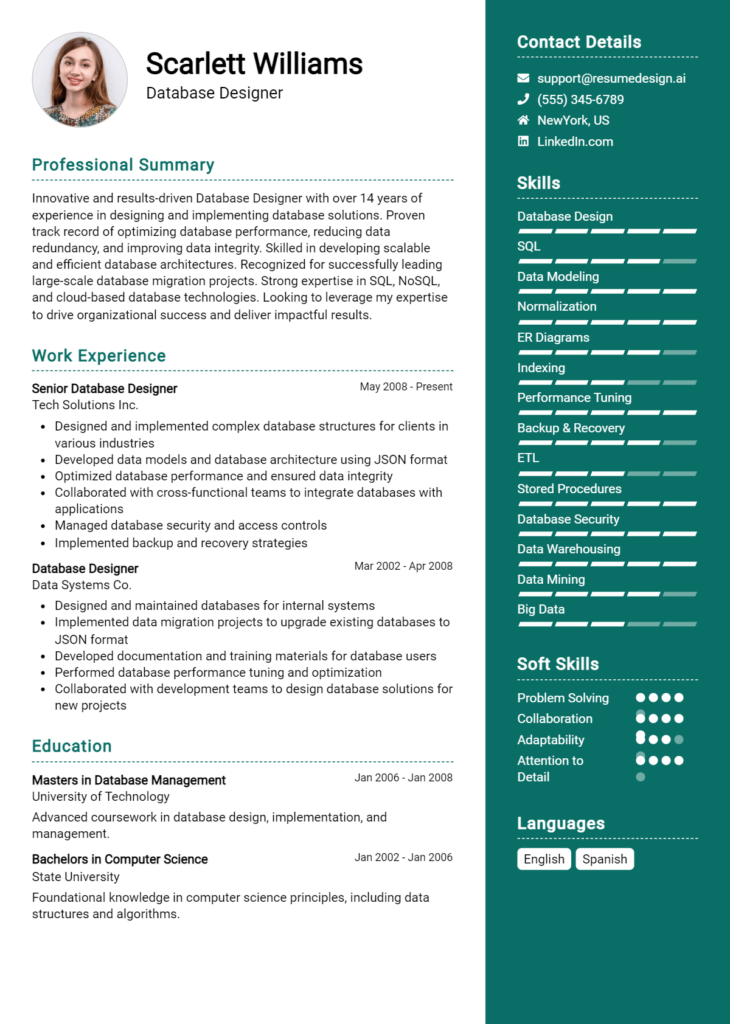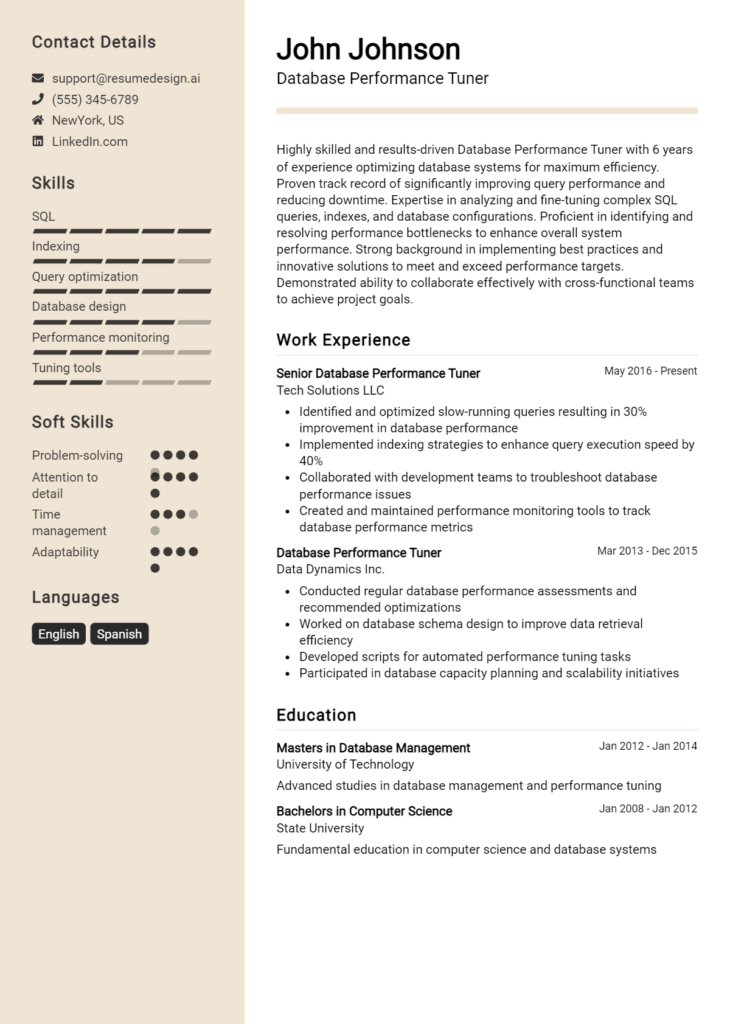Database Chaos Engineering Specialist Core Responsibilities
A Database Chaos Engineering Specialist is responsible for designing and implementing experiments that simulate failures in database systems, ensuring resilience and reliability. This role requires a blend of technical expertise in database management, operational insight, and strong problem-solving skills. By collaborating with development, operations, and security teams, the Specialist enhances system robustness and contributes to the organization's overall goals. A well-structured resume should highlight these qualifications, showcasing the candidate’s ability to bridge functions and drive innovation.
Common Responsibilities Listed on Database Chaos Engineering Specialist Resume
- Design and execute chaos experiments to identify database vulnerabilities.
- Collaborate with cross-functional teams to enhance database resilience.
- Monitor and analyze system performance during chaos testing.
- Develop and maintain documentation for chaos engineering processes.
- Implement automated testing frameworks for database systems.
- Identify and mitigate potential risks in database configurations.
- Train and mentor team members on chaos engineering principles.
- Report findings and recommend improvements to database architecture.
- Stay updated with industry trends and emerging technologies.
- Ensure compliance with data governance and security policies.
- Facilitate post-experiment reviews and refine testing strategies.
- Collaborate with DevOps teams to integrate chaos testing into CI/CD pipelines.
High-Level Resume Tips for Database Chaos Engineering Specialist Professionals
In today's competitive job market, a well-crafted resume is essential for Database Chaos Engineering Specialist professionals aiming to make a strong first impression. Your resume serves as the initial point of contact with potential employers, showcasing not only your technical skills but also your achievements in the field. It is crucial that this document accurately reflects your capabilities and experience while aligning with the specific requirements of the job you are targeting. This guide will provide practical and actionable resume tips tailored specifically for Database Chaos Engineering Specialist professionals, helping you create a compelling narrative that stands out to hiring managers.
Top Resume Tips for Database Chaos Engineering Specialist Professionals
- Tailor Your Resume: Customize your resume for each position by aligning your skills and experience with the job description.
- Highlight Relevant Experience: Focus on previous roles that involved database management, chaos engineering, or system resilience.
- Quantify Achievements: Use metrics to demonstrate your impact, such as improved performance percentages, reduced downtime, or cost savings.
- Showcase Technical Skills: Include industry-specific skills such as database technologies (SQL, NoSQL), cloud platforms, and chaos engineering tools (e.g., Gremlin, Chaos Monkey).
- Utilize Keywords: Incorporate relevant keywords from the job description to pass through Applicant Tracking Systems (ATS).
- Include Certifications: List any relevant certifications that enhance your qualifications, such as AWS Certified Database Specialty or Certified Kubernetes Administrator.
- Demonstrate Problem-Solving: Highlight specific instances where you identified issues and implemented solutions to improve database reliability.
- Keep It Concise: Ensure your resume is clear and concise, ideally one page, focusing on the most relevant information.
- Professional Format: Use a clean and professional format that enhances readability and maintains a professional appearance.
By implementing these tips, you can significantly increase your chances of landing a job in the Database Chaos Engineering Specialist field. A tailored, achievement-focused resume that effectively showcases your skills and experience will make you a more attractive candidate to potential employers, setting the stage for successful interviews and career advancement.
Why Resume Headlines & Titles are Important for Database Chaos Engineering Specialist
In the competitive field of Database Chaos Engineering, a well-crafted resume headline or title is crucial for making a strong first impression. This brief but powerful phrase serves as the candidate's introduction to hiring managers, summarizing their key qualifications and unique selling points. A strong headline can instantly capture attention and provide a clear snapshot of the candidate's expertise, making it easier for recruiters to identify top talent. It is essential that this headline is concise, relevant, and directly aligned with the job being applied for to enhance the chances of landing an interview.
Best Practices for Crafting Resume Headlines for Database Chaos Engineering Specialist
- Keep it concise: Aim for a headline that is no longer than 10 words.
- Be role-specific: Use terminology and keywords relevant to Database Chaos Engineering.
- Highlight key skills: Incorporate essential skills that are sought after in the role.
- Showcase achievements: Mention notable accomplishments that demonstrate your impact in previous roles.
- Use action-oriented language: Start with strong action verbs to convey confidence and expertise.
- Tailor for the job: Customize your headline for each application to align with the specific job description.
- Avoid generic phrases: Steer clear of vague terms that do not add value to your candidacy.
- Maintain professionalism: Ensure the tone is professional and aligns with industry standards.
Example Resume Headlines for Database Chaos Engineering Specialist
Strong Resume Headlines
"Expert Database Chaos Engineer with Proven Disaster Recovery Solutions"
"Innovative Chaos Engineering Specialist Driving Database Resilience & Performance"
“Results-Driven Database Chaos Engineer with 5+ Years in High-Availability Systems”
Weak Resume Headlines
“Database Engineer”
“Looking for Opportunities in IT”
Strong headlines are effective because they immediately convey the candidate's expertise, skills, and accomplishments that are relevant to the role of a Database Chaos Engineering Specialist. They use specific language and keywords that resonate with hiring managers, making it clear why the candidate is a good fit for the position. In contrast, weak headlines tend to be vague and generic, failing to highlight any unique qualifications or strengths. As a result, they do not capture the attention of recruiters and diminish the candidate's chances of standing out in a competitive job market.
Writing an Exceptional Database Chaos Engineering Specialist Resume Summary
A well-crafted resume summary is crucial for a Database Chaos Engineering Specialist as it serves as the first impression for hiring managers. This brief yet powerful statement encapsulates the candidate’s key skills, experience, and accomplishments, allowing them to quickly gauge suitability for the role. A strong summary should be concise, impactful, and tailored specifically to the job being applied for, effectively capturing the essence of what the candidate brings to the table and setting the tone for the rest of the resume.
Best Practices for Writing a Database Chaos Engineering Specialist Resume Summary
- Quantify achievements to provide measurable impact, such as reducing downtime by a specific percentage.
- Focus on relevant skills like database design, performance tuning, and chaos engineering tools.
- Tailor the summary to match the job description, using keywords and phrases from the posting.
- Highlight specific accomplishments that demonstrate expertise and problem-solving capabilities.
- Keep it concise—ideally 2-3 sentences that convey the most important information.
- Use action verbs to create a sense of dynamism and engagement.
- Showcase familiarity with industry standards and best practices to establish credibility.
- Include a blend of technical skills and soft skills, such as teamwork and communication.
Example Database Chaos Engineering Specialist Resume Summaries
Strong Resume Summaries
Results-driven Database Chaos Engineering Specialist with over 5 years of experience optimizing database systems, achieving a 30% reduction in latency and a 40% increase in uptime through innovative chaos testing strategies.
Dynamic Database Chaos Engineer skilled in implementing chaos engineering principles that enhanced system reliability, leading to a 25% decrease in incident response time and improved overall customer satisfaction ratings.
Experienced Database Chaos Engineering Specialist with a proven track record of conducting risk assessments and executing stress tests, resulting in a 50% reduction in data loss incidents and significantly improving data integrity.
Talented Database Chaos Engineering Specialist adept at deploying automated chaos experiments, successfully increasing database resilience by 35% while collaborating with cross-functional teams to enhance system performance.
Weak Resume Summaries
Experienced database engineer with knowledge of chaos engineering techniques and tools.
Database specialist with a focus on improving systems and ensuring reliability.
The strong resume summaries are considered effective because they provide specific, measurable outcomes that highlight the candidate’s skills and experiences related to chaos engineering. They clearly demonstrate how the candidate has made a tangible impact in previous roles. In contrast, the weak summaries lack detail and do not quantify any achievements, making them too vague and generic for hiring managers to glean valuable insights about the candidate's capabilities.
Work Experience Section for Database Chaos Engineering Specialist Resume
The work experience section of a Database Chaos Engineering Specialist resume is crucial in demonstrating the candidate's technical skills and practical expertise in managing complex database systems under stress. This section not only highlights the applicant's ability to lead teams in executing chaos engineering practices but also showcases their commitment to delivering high-quality products in dynamic environments. By quantifying achievements and aligning their experience with industry standards, candidates can effectively convey their value to potential employers, making this section a key focal point in the resume.
Best Practices for Database Chaos Engineering Specialist Work Experience
- Clearly outline technical skills relevant to chaos engineering, such as database management, resilience testing, and automation tools.
- Quantify achievements with specific metrics, such as performance improvements, reduced downtime, or increased system resiliency.
- Highlight leadership experiences, including managing teams or cross-functional collaboration on chaos engineering projects.
- Use action verbs to describe responsibilities and contributions, emphasizing proactive engagement in problem-solving.
- Align previous roles with industry best practices and standards, showcasing adaptability and knowledge of current trends.
- Incorporate feedback or outcomes from stakeholders to demonstrate successful collaboration and communication skills.
- Tailor the work experience section to match the job description, focusing on relevant experiences that align with the desired qualifications.
- Include ongoing education or certifications that pertain to chaos engineering, emphasizing a commitment to professional development.
Example Work Experiences for Database Chaos Engineering Specialist
Strong Experiences
- Led a cross-functional team in implementing chaos engineering practices, resulting in a 30% reduction in database downtime during peak usage periods.
- Developed and executed automated resilience tests that improved system recovery time by 40%, significantly enhancing overall database performance.
- Collaborated with DevOps teams to integrate chaos engineering tools into CI/CD pipelines, leading to a 25% increase in deployment success rates.
- Conducted workshops on chaos engineering principles, training over 50 team members and fostering a culture of reliability and resilience across the organization.
Weak Experiences
- Worked on database projects that involved some testing and monitoring.
- Participated in team meetings to discuss database issues.
- Helped improve system performance in various ways.
- Involved in chaos engineering tasks as part of a larger team.
The examples provided illustrate a clear distinction between strong and weak experiences. Strong experiences are characterized by specific, quantifiable outcomes and demonstrate leadership, collaboration, and technical expertise. They effectively highlight the candidate's impact on their organization and their proactive approach to chaos engineering. In contrast, weak experiences lack detail and specificity, making them unimpressive and failing to communicate the candidate's value effectively. By focusing on measurable achievements and relevant skills, candidates can present a compelling case for their qualifications in the field of database chaos engineering.
Education and Certifications Section for Database Chaos Engineering Specialist Resume
The education and certifications section is a vital component of a Database Chaos Engineering Specialist resume. It effectively showcases the candidate's academic background and industry-relevant certifications, demonstrating their commitment to continuous learning and professional development. By including relevant coursework, specialized training, and recognized credentials, candidates can significantly enhance their credibility and alignment with the specific demands of the job role. This section not only highlights technical expertise but also reflects the candidate's dedication to mastering the complexities of database systems and chaos engineering practices.
Best Practices for Database Chaos Engineering Specialist Education and Certifications
- Prioritize relevant degrees in fields such as Computer Science, Information Technology, or Software Engineering.
- Include industry-recognized certifications, such as AWS Certified Solutions Architect or Certified Kubernetes Administrator.
- List any specialized training in chaos engineering tools and methodologies, like Gremlin or Chaos Monkey.
- Highlight coursework that directly pertains to database management, systems architecture, or reliability engineering.
- Keep the section concise but detailed, ensuring clarity on how each credential relates to the chaos engineering domain.
- Update the section periodically to reflect new certifications and educational achievements relevant to the industry.
- Include any practical projects or case studies completed during coursework that demonstrate hands-on experience.
- Consider including honors or distinctions received during education to further enhance credibility.
Example Education and Certifications for Database Chaos Engineering Specialist
Strong Examples
- Bachelor of Science in Computer Science, University of XYZ, Graduated May 2021
- AWS Certified Solutions Architect – Associate, Certification obtained June 2022
- Coursework: Advanced Database Systems, Reliability Engineering, and Distributed Systems
- Certified Kubernetes Administrator (CKA), Certification obtained January 2023
Weak Examples
- Associate Degree in Graphic Design, College of ABC, Graduated May 2019
- Certification in Microsoft Office Suite, Certification obtained August 2020
- Coursework: Introduction to Art History and Basic Computer Skills
- Certificate in Social Media Marketing, Certification obtained February 2021
The strong examples are considered relevant as they directly align with the skills and knowledge required for a Database Chaos Engineering Specialist, showcasing both technical education and applicable certifications. In contrast, the weak examples reflect qualifications that do not pertain to the chaos engineering domain, which could undermine the candidate's suitability for the role. Including strong, relevant credentials helps to present a compelling case for the candidate's expertise and readiness to tackle challenges in database chaos engineering.
Top Skills & Keywords for Database Chaos Engineering Specialist Resume
In the rapidly evolving field of database management, a Database Chaos Engineering Specialist plays a crucial role in ensuring system resilience and reliability. Crafting a standout resume for this position requires a keen focus on both hard and soft skills. The right skills not only demonstrate technical proficiency but also highlight the ability to navigate complex, unpredictable environments. A well-rounded skill set can effectively convey to potential employers that a candidate is equipped to handle the challenges of maintaining database integrity while simulating faults and understanding system behavior. By emphasizing the appropriate skills in your resume, you can significantly enhance your chances of landing an interview and ultimately securing the role.
Top Hard & Soft Skills for Database Chaos Engineering Specialist
Soft Skills
- Problem-solving
- Critical thinking
- Adaptability
- Communication
- Collaboration
- Attention to detail
- Innovative mindset
- Time management
- Leadership
- Empathy
Hard Skills
- Proficiency in SQL and NoSQL databases
- Experience with chaos engineering tools (e.g., Gremlin, Chaos Monkey)
- Knowledge of cloud services (AWS, Azure, GCP)
- Understanding of system architecture
- Skills in scripting languages (Python, Bash)
- Familiarity with monitoring and observability tools (Prometheus, Grafana)
- Database performance tuning and optimization
- Backup and recovery strategies
- Infrastructure as Code (IaC) concepts
- Security best practices for databases
For a comprehensive look at how to highlight these skills and effectively showcase your work experience, be sure to tailor your resume to reflect the demands of the Database Chaos Engineering Specialist role.
Stand Out with a Winning Database Chaos Engineering Specialist Cover Letter
I am excited to apply for the Database Chaos Engineering Specialist position at [Company Name], as advertised on [Job Board/Company Website]. With a solid background in database management and a keen interest in chaos engineering principles, I am confident that my skills will contribute significantly to your team. My experience in designing and implementing chaos experiments has equipped me with the necessary tools to enhance database resilience and performance, ensuring that [Company Name] remains a leader in delivering reliable data-driven solutions.
In my previous role at [Previous Company Name], I led initiatives to simulate failure scenarios across various database systems to test their robustness and recovery processes. By leveraging chaos engineering techniques, I was able to identify critical weaknesses and optimize our databases, ultimately reducing downtime by 30%. My proficiency in tools such as Gremlin and Chaos Monkey, coupled with my strong analytical skills, allows me to efficiently assess system performance under stress, identify bottlenecks, and develop actionable strategies for improvement. I am passionate about fostering a culture of resilience and continuous improvement, and I believe that my experience aligns well with the goals of [Company Name].
Collaboration is at the heart of successful chaos engineering, and I thrive in team-oriented environments. I have worked closely with development and operations teams to integrate chaos testing into the software development lifecycle, ensuring that our services are designed with failure in mind. My commitment to communication and knowledge sharing has helped cultivate a culture of learning and adaptability within my teams. I am eager to bring this collaborative spirit to [Company Name] and work alongside talented professionals to drive innovative solutions in database management.
Thank you for considering my application for the Database Chaos Engineering Specialist position. I am excited about the opportunity to contribute to [Company Name]'s mission of delivering exceptional data reliability and performance. I look forward to discussing how my background, skills, and enthusiasm for chaos engineering can be an asset to your team.
Common Mistakes to Avoid in a Database Chaos Engineering Specialist Resume
When crafting a resume for a Database Chaos Engineering Specialist position, it is essential to present your skills and experiences effectively. However, many candidates make common mistakes that can hinder their chances of landing an interview. By avoiding these pitfalls, you can create a compelling resume that highlights your qualifications and expertise in database management and chaos engineering.
Neglecting Relevant Keywords: Failing to include industry-specific keywords can lead to your resume being overlooked by Applicant Tracking Systems (ATS) and hiring managers. Ensure you incorporate terms related to chaos engineering, database technologies, and system resilience.
Lack of Quantifiable Achievements: Simply listing job responsibilities without quantifying your accomplishments can weaken your resume. Use metrics to demonstrate your impact, such as "reduced database downtime by 30%" or "improved system performance by 25%."
Overly Technical Jargon: While it's important to showcase your technical skills, using too much jargon can alienate non-technical hiring managers. Strive for a balance that conveys your expertise without losing clarity.
Ignoring Soft Skills: Chaos engineering requires collaboration and problem-solving abilities. Failing to highlight soft skills such as teamwork, communication, and critical thinking can make your resume less appealing.
Poor Formatting: A cluttered or inconsistent format can distract from your qualifications. Use clear headings, bullet points, and a professional font to enhance readability and organization.
Listing Irrelevant Experience: Including unrelated work experience can dilute your resume's focus. Tailor your content to emphasize roles and projects that showcase your skills in database management and chaos engineering.
Omitting Continuous Learning: The tech industry is constantly evolving. Not mentioning certifications, courses, or workshops related to chaos engineering or database technologies can signal a lack of commitment to professional growth.
Failing to Customize for Each Application: Sending out a generic resume can hurt your chances. Always tailor your resume to align with the specific requirements of the job description, emphasizing the most relevant experiences and skills.
Conclusion
As a Database Chaos Engineering Specialist, your role is critical in ensuring the resilience and reliability of database systems under various stress conditions. Throughout this article, we've explored the importance of chaos engineering in database management, including techniques for simulating failures, identifying weaknesses, and implementing effective recovery strategies. Emphasizing a culture of experimentation and continuous improvement, we highlighted the need for collaboration between development and operations teams to enhance system robustness.
Moreover, we discussed essential skills and qualifications that employers look for, such as proficiency in database technologies, programming languages, and an understanding of cloud infrastructure. With the growing demand for professionals in this field, it’s vital to present yourself effectively through your resume.
Now is the perfect time to review and enhance your Database Chaos Engineering Specialist resume. Ensure it reflects your skills and experiences accurately to stand out in a competitive job market. To assist you in this process, consider utilizing resources like resume templates, a resume builder, resume examples, and cover letter templates. Take action today to secure your position as a leader in the evolving landscape of database chaos engineering!

